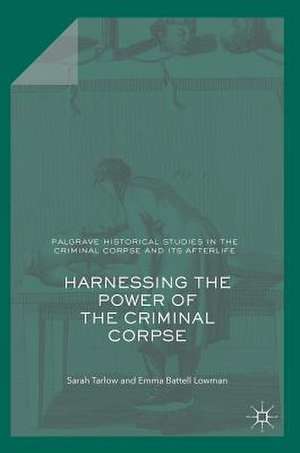Harnessing the Power of the Criminal Corpse: Palgrave Historical Studies in the Criminal Corpse and its Afterlife
Autor Sarah Tarlow, Emma Battell Lowmanen Limba Engleză Hardback – 5 iun 2018
| Toate formatele și edițiile | Preț | Express |
|---|---|---|
| Paperback (1) | 191.47 lei 38-44 zile | |
| Springer International Publishing – 14 dec 2018 | 191.47 lei 38-44 zile | |
| Hardback (1) | 226.65 lei 6-8 săpt. | |
| Springer International Publishing – 5 iun 2018 | 226.65 lei 6-8 săpt. |
Din seria Palgrave Historical Studies in the Criminal Corpse and its Afterlife
-
 Preț: 237.05 lei
Preț: 237.05 lei -
 Preț: 221.06 lei
Preț: 221.06 lei -
 Preț: 223.95 lei
Preț: 223.95 lei -
 Preț: 175.58 lei
Preț: 175.58 lei -
 Preț: 229.72 lei
Preț: 229.72 lei - 15%
 Preț: 590.16 lei
Preț: 590.16 lei -
 Preț: 218.00 lei
Preț: 218.00 lei -
 Preț: 218.77 lei
Preț: 218.77 lei
Preț: 226.65 lei
Nou
Puncte Express: 340
Preț estimativ în valută:
43.37€ • 45.37$ • 36.03£
43.37€ • 45.37$ • 36.03£
Carte tipărită la comandă
Livrare economică 02-16 aprilie
Preluare comenzi: 021 569.72.76
Specificații
ISBN-13: 9783319779072
ISBN-10: 3319779079
Pagini: 316
Ilustrații: X, 273 p. 31 illus.
Dimensiuni: 148 x 210 mm
Greutate: 0.49 kg
Ediția:1st ed. 2018
Editura: Springer International Publishing
Colecția Palgrave Macmillan
Seria Palgrave Historical Studies in the Criminal Corpse and its Afterlife
Locul publicării:Cham, Switzerland
ISBN-10: 3319779079
Pagini: 316
Ilustrații: X, 273 p. 31 illus.
Dimensiuni: 148 x 210 mm
Greutate: 0.49 kg
Ediția:1st ed. 2018
Editura: Springer International Publishing
Colecția Palgrave Macmillan
Seria Palgrave Historical Studies in the Criminal Corpse and its Afterlife
Locul publicării:Cham, Switzerland
Cuprins
SECTION ONE: THE CRIMINAL CORPSE IN HISTORY.- 1. Introduction.- 2. The Power of the Criminal Corpse in the Medieval World.- 3. How was the Power of the Criminal Corpse Harnessed in Early Modern England?.- SECTION TWO: THE WORLD OF THE MURDER ACT.- 4. Murder and the Law, 1752-1832.- 5. Anatomisation and Dissection.- 6. Hanging in Chains.- SECTION THREE: THE LEGACY OF THE CRIMINAL CORPSE.- 7. Seeking the Physical Remains of the Criminal Corpse.- 8. Folk Beliefs and Popular Tales.- 9. Conclusions: Ethics, Bullet Points and Other Ways of Telling.- Index.
Notă biografică
Sarah Tarlow is Professor of Historical Archaeology at the University of Leicester, UK. She has published extensively on the archaeology of death and burial, archaeological ethics, and the post-medieval archaeology of the British isles. She was PI on ‘Harnesssing the Power of the Criminal Corpse’, the research project on which this book is based.
Emma Battell Lowman is Lecturer in the History of the Americas at the University of Hertfordshire, UK, with research interests in historical narrative, connections between bodies and memory, and the use of power to shape social identity. She holds postgraduate degrees from the University of Victoria, Canada, and the University of Warwick.
Textul de pe ultima copertă
This open access book is the culmination of many years of research on what happened to the bodies of executed criminals in the past. Focusing on the eighteenth and nineteenth centuries, it looks at the consequences of the 1752 Murder Act. These criminal bodies had a crucial role in the history of medicine, and the history of crime, and great symbolic resonance in literature and popular culture. Starting with a consideration of the criminal corpse in the medieval and early modern periods, chapters go on to review the histories of criminal justice, of medical history and of gibbeting under the Murder Act, and ends with some discussion of the afterlives of the corpse, in literature, folklore and in contemporary medical ethics. Using sophisticated insights from cultural history, archaeology, literature, philosophy and ethics as well as medical and crime history, this book is a uniquely interdisciplinary take on a fascinating historical phenomenon.
Caracteristici
Examines what role the criminal corpse has historically played in the negotiation of social and cultural beliefs Brings together research and findings from across the book series to create an interdisciplinary work Utilises a longue durée approach spanning from the medieval period to present day
